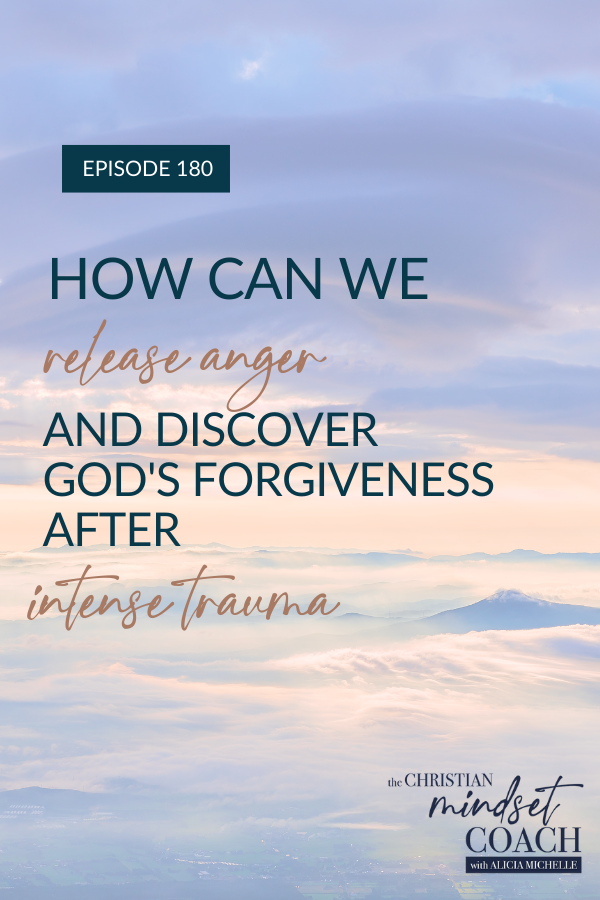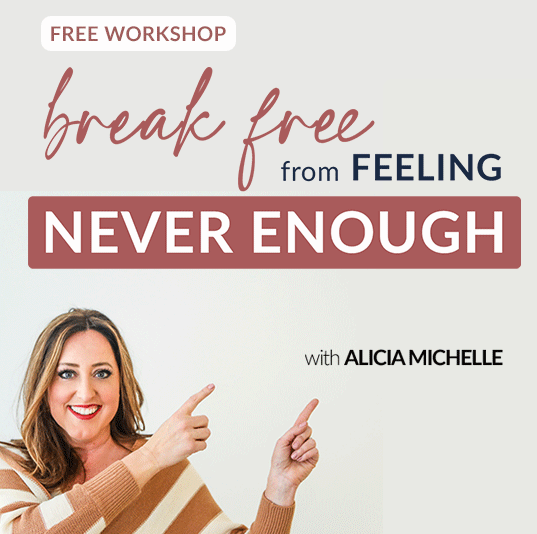How can we release anger and learn to walk the path to forgiveness after experiencing intense childhood trauma, such as physical and sexual abuse? Today Elishaba Doerksen shares part two of her dramatic story, this time focusing on her journey to heal and forgive her father and herself by finding God’s forgiveness, after years of horrific abuse from her father.
NOTE: Because Elishaba shares openly about her traumatic experiences, this conversation contains graphic and potentially triggering content that may not be appropriate for all audiences. In addition, the end of this episode contains resources to find forgiveness and healing if you too have been a victim of abuse.

WHAT YOU’LL LEARN:
- [4:10] Elishaba Begins to Heal Her Wounds After Suffering Intense Trauma
- [8:35] The Ultimate Healing Comes From God and Only God
- [11:43] From Religion to Relationships and Discovering God’s Forgiveness
- [16:36] How to Release Anger About the Past and Forgive Yourself to Move Forward
- [19:06] The Most Pivotal Part of Elishaba’s Journey to Redemption
- [24:58] How Her Husband Helped Her Heal from Past Trauma and Start Fresh Together
- [30:32] Discovering The True Journey of Forgiveness and Choosing To Forgive
- [33:26] Writing Her Book After Uncovering the Layers of Childhood Trauma
- [36:43] How To Know When You’re Ready to Forgive After Suffering Abuse
- [43:08] The Real Enemy of Intense Trauma Is Not the Person Who Hurt You
- [47:06] Elishaba Advice To Those Trying To Heal from Childhood Trauma
- [55:22] Resources for Healing Intense Trauma and Accepting God’s Forgiveness
[4:10] Elishaba Begins to Heal Her Wounds After Suffering Intense Trauma
Elishaba shares her testimony of how she turned the intense trauma she went through and her journey from living with unforgiveness for many years to uncovering God's forgiveness. The road to healing was far from easy, but with God's comfort and strength, she could forgive her father and move forward with her life.
In her book, “Out of the Wilderness,” Elishaba recalls a time when the family who took her in spoke with her about forgiveness. She told the man, “How can I forgive my father? He has taken everything away from me. I'm nearly 30 years old and should be getting started in life. These words came out with loud cries from deep in my throat.”
The man responded to her, “Do you think if a man shoots you in the shoulder, leaving a gaping wound that he can turn around and ask forgiveness if nothing happened? The man can be so sorry that he takes you to the hospital and sits by your side, but it won't change the fact that you now have a hole in your shoulder for the rest of your life. Your father has wounded you, and your pain is so great that it can't disappear quickly, even if he is truly sorry.”
She shared that the feeling during this conversation was deeply hurt and felt like she had a deep wound that carried unbearable pain. From this analogy, she learned that the damage doesn't just heal on its own; she had to pay attention to it and get help to release the anger and heal.
[8:35] The Ultimate Healing Comes From God and Only God
One of the interesting things about healing is that we can do all the right things when healing from a physical wound. We can put medicine on it and do physical therapy if required, but the ultimate healing is up to God and His timing. We can't rush it or speed up the healing process; we must keep showing up.
This can be a scary place of trust, where we would rather close the door and put it all behind us so we don't want to think about or talk about it. Because we want to be able to say if I do this and this, it'll be fixed, but that's not how healing works. Healing is showing up and doing what you know God is calling you to do next to relieve the gangrene that set into the wound, Elishaba shares. Then once you do your part, you have to wait for Him to show up, and it's not always easy to do that.
This process can make relationships more complicated when you are someone who can't handle pain. For example, someone closes off all your pain, and when you meet somebody else who has pain, you shut them out, leading to shallow, surface-level relationships.
The truth is God has called us to be healers, his hands and feet in this world, which means we must address these deeper things. We have to get past the superficial and have each other help and share our stories.
Anyone who has suffered intense trauma and pain must heal to be able to help the next person heal, but it all starts with us, and we have first to do the work to heal ourselves.
[11:43] From Religion to Relationships and Discovering God’s Forgiveness
Elishaba shares how she went from religion to relationship because, for a long time, she felt stuck, like she had to prove herself. She said it felt like a culture shock because, at 29 years old, she had never experienced anything in this world, never had any schooling, and never heard about movies or everyday things in life that people bring up now. She recalls feeling out of place because she didn't know what people were talking about, which all led her to a deep desire to have to prove herself to be good enough.
All these conflicting feelings of never feeling good enough and not feeling smart enough made her feel so angry. Through this anger and unworthiness, she couldn't even fathom forgiving her father for all the intense trauma and wanted someone to pay for it all.
It reached a point where Elishaba reached rock bottom, and it was in that place that she found Jesus. She said it reminded her of the story in the Bible of the woman who bled for 12 years, and in her Jewish culture, blood meant unclean. This poor woman had lost everything and was determined to be healed. The Bible says she exhausted all her options trying to find doctors and find healing, and she had reached rock bottom, and there was no way out. Until she saw the Savior walk through the streets, it was then, when the crowds were so strong around him, she decided and was willing at that moment to do whatever it took to reach out and to get the edge of his garment, to be healed.
That story was much like Elishaba’s; she reached her rock bottom with nowhere else to go and instead reached for Jesus in desperation. She had run away from everybody and had lost everything feeling hopeless.
But she chose to reach out one more time and asked Jesus, “Is there any hope? Will you accept me?” And she says, “What I found was a God that had already received me, his arms were still stretched out waiting, and he was still Jesus!” She testifies that even in all the pain, Jesus was there throughout her life, and the only thing holding her back from receiving Him was herself.
She shares that this moment was the beginning of believing maybe she would someday be able to forgive because there was one person that needed forgiveness before she could forgive anybody else, and that was her. She needed to receive God's best for her life, and that was the start of the journey of really beginning to forgive others.
[16:36] How to Release Anger About the Past and Forgive Yourself to Move Forward
Elishaba mentions in her book she needed to stop blaming her father for her actions and let God take complete control of her past, present, and future. She shares that sometimes when we're processing intense trauma and grieving what was lost, it's hard for us to see the whole picture and not just blame the other person for their actions.
She shares how she learned to surrender her behavior to be released from what she experienced and finally be able to forgive herself truly. It was hard to explain how much joy she found in realizing she didn't have to prove herself good enough and learning that she could even find joy in being wrong. To finally move past the fear that when she was wrong, knowing there not be any punishment. But she didn't understand this for long because she always believed forgiveness had to be earned.
[19:06] The Most Pivotal Part of Elishaba’s Journey to Redemption
The critical thing in Elishaba’s recovery was when she visited Rainbow Cross with her husband the New Mexico house she lived in. She experienced all these years of abuse and neglect before coming to Alaska. At that moment, Elishbaba decided to take back what was stolen from her and press forward with the love of her life.
Elishaba shared that when she got married she learned about the power of redemption. The trauma of her past could have easily defeated her and taken her back to all of the pain. But she shares that we have to decide what we will focus on. She says that God does give us a new start, but we have to choose to use it. After they got married, they took a honeymoon to the mountains of New Mexico where she had lived under her father’s abuse for 25 years. Her husband wanted to take her back to those places, back into those dark doors.
She and her husband visited the house where Elishaba had lived, and Elishaba began to shut down and felt intense anger. She felt the type of anger that leads to sabotaging relationships because right then, it was her past fears and hurt coming to the surface. She admits that she was getting ready to damage the relationship with her husband, who was there to love her. She admitted she couldn’t stay in that place because it was the spot where her father had raped and abused her for many years.
At that moment, she opened up her most profound hurt to her husband to let him in, and together they conquered the pain. Elishaba decided to allow God to work through her at that moment and grow closer to her husband, and instead of shutting down, create new memories in this place with her loving, devoted husband that God brought to her.
[24:58] How Her Husband Helped Her Heal from Past Trauma and Start Fresh Together
Through it all, she and her husband were able to realize what redemption was. She shares that redemption is exchanging good for evil (as Joseph said in the Bible to his brothers, that what was meant for evil, God meant for good), and that’s what happened for them on that day.
There were still scriptures when they went to the bathtub where her father had her trapped for so many hours. When her husband saw this with his own eyes, it hurt his heart to see the mockery of scriptures being in the same place where she’d suffered childhood trauma.
She shares that, in marriage, when either spouse has experienced massive trauma, the other spouse has to reconcile that trauma too because a husband and wife become one when they marry. The husband must find a way to process and let go of all his wife has gone through, and vice versa if the husband has suffered trauma. For Elishaba's husband, he made the decision to go to that spot in New Mexico and decided that this will not have control over the future and their life together. Yet spouses still must walk the journey and have to find their own forgiveness and release.
She shares how her husband has his own trauma. She says he grew up with pain and abandonment and was scared to death of pain. Yet, God brought him to marry this woman full of pain, just another part of redemption, and this was part of God’s story. We learn to heal, help each other move forward, and accept God's grace and forgiveness, she says.
[30:32] Discovering The True Journey of Forgiveness and Choosing To Forgive
It wasn't until after getting married that she started finding the true journey of forgiveness. She had the desire to forgive at this point. But what brought forgiveness more to her attention was when she walked into the courtroom and had to face her father. She thought she had come so far but hadn't thought she would ever see his face again, and if she did, she feared she would not be able to look at him in the beginning because her father was able to control her with only his eyes entirely, which scared her deeply.
The day she finally saw him in the courtroom, he tried to control her in every way possible. But her husband had encouraged me to write everything into words and be able to read it to her father's face. She had forgiven him that much and told him, but it was his turn to speak when it was all over. She was devastated because not only did he not say he was sorry, but he had the nerve to call her and her husband to repentance, and he was justifying things by misquoting Scripture.
After this courtroom encounter, Elishaba realized that true forgiveness offers forgiveness without any expectation or demand that that person will reconcile or apologize. But at that moment, she could not forgive. She still wanted him to pay for what he had done and felt her life depended on him saying he was sorry, and when he didn't, she was devastated.
[33:26] Writing Her Book After Uncovering the Layers of Childhood Trauma
It wasn’t until she started writing her book, which opened up the doors, and started the flood of memories. At that moment, she didn’t believe she was ready to write the book and face it all.
But instead of giving up, she started on this deeper journey of climbing that mountain and facing all of her hurt, and shame. She learned it all had to be sorted out, so she made the decision to go to counseling. In the journey to heal, she realized that part of the journey to forgiveness was uncovering the layers and understanding the truth. First, you have to receive God's forgiveness and know who you are in God's sight, she says.
Elishaba recalls a time when her counselor asked her a few questions, like “Where are the places where you minimized the sin? Where did your father minimize things?” These questions uncovered the answers to her deepest, dark feelings of shame which was not knoiwng why her body responded at times to the sexual abuse from her father and finding out that the truth was she had no contorl over her body’s response.
Finally, on Father's Day she faced it all and knew she was ready to go out to her father's grave, and kneel down and say, ”I forgive you, Papa.” It was a powerful moment and something that took so much healing to be able to come to terms with and be able to leave behind all of the pain.
[36:43] How To Know When You’re Ready to Forgive After Suffering Abuse
Elishaba shares how she always heard many good Christians say that if we put the past behind us, we must forgive because God says to forgive. But it is challenging to be able to forgive because it means you have to look back and remember the pain you are trying to leave behind. It all starts with choosing to go deep into your heart to understand what forgiveness means. Sometimes rushing to forgive can cause even more damage because the pain can turn into shame. But once you reach the point, like she did when you are ready to weep and release all of the anger you once carried with you, you are at a place where you can forgive.
The fruit of forgiving involves accepting what you have and knowing that it is good, Elishaba says. She says what’s really helped her in her healing is remembering that all the things meant for evil, God has now used it for good, and that He accepts us. These truths allowed her to have a deep knowing that she could forgive all of the transgressions against her too, as God did for her.
[43:08] The Real Enemy of Intense Trauma Is Not the Person Who Hurt You
She learned that her father wasn't the ultimate enemy. It was Satan who tried to destroy her. The enemy tried to kill the dignity God had granted her when she was formed in her mother's womb. But she didn't let the enemy take control of her future; instead, she healed beyond it and let it become part of her testimony.
Her perspective on this shifted after realizing that her father was wounded from a trauma-filled childhood, but he continued that pattern with his children and made them feel the way his parents made him feel. Once she realized this, she knew she had the option to carry on the same generational pain or rewrite her own story, which is what she has done with her children. Finding God's forgiveness was transformative in Elishaba's life because it helped her move on, be free from the guilt and forgive those who hurt her.
[47:06] Elishaba’s Advice To Those Trying To Heal from Childhood Trauma
Elishaba shares her advice for those on their journey trying to heal from intense trauma. She reminds us there's no way we can forgive someone who hurt us until we know that we're loved, forgiven, and cherished by God. He is the wounded healer and can turn awful scars into good ones.
She encourages us to not focus on the line, “God forgave, so you have to forgive because that's what we're supposed to do.” Instead, she says, “we must shift the focus to knowing that we are loved and worthy.” Once we know those things, we can move forward knowing that we can turn and forgive someone else.
She reminds us that forgiveness doesn't mean to stop protecting ourselves, ignoring the evil done to us, or that we should put ourselves right back in that situation because that's not loving or accepting God's love for us.
When we forgive from this place, we no longer depend on the other person apologizing to feel justified, worthy, or like we can move on. We know our worth and dignity are in Christ so we can move forward with faith and grace.
[55:22] Resources for Healing Intense Trauma and Accepting God’s Forgiveness
We shared a tiny portion of her story over the last two episodes. To learn more about the journey and to hear Elishaba's whole story, you can purchase her book, “Out of the Wilderness.”
Has forgiveness been an obstacle for you, friend? Because you've needed to hear the other person admit they were wrong and apologize for how they hurt you?
I hope after this episode, you've gathered that the person doesn't need to admit fault or apologize to get to that next level. This might make forgiveness more challenging, but forgiveness from intense trauma is still possible, even if you don’t hear it from the other person.
I like how she separated the two kinds of forgiveness: that forgiveness can come when the person admits to it and offers an apology; and that forgiveness can also come even when the person never admits to it or has passed away and hasn't had a chance to own up to it.
The other thing I wanted to highlight was that we talked about how we are quick to rush to forgiveness without doing that important work of processing the pain. We see this all the time, especially in the Church. Sometimes in our well-meaning intentions, we tell ourselves or others that we need to forgive and forget. We need to push on. We need to move forward. We need to believe because God forgave me for all this, which means I can forgive them. But first, we must do the internal work and process that real and raw pain we feel.
If you aren't aware of a trusted Christian counselor in your area who can work with you to process the intense trauma, I encourage you to check out Faithful Counseling. This is an online Christian counseling service that I highly recommend. They will match you with a licensed therapist who specializes in helping people work through your significant issues, no matter where you are in the world. They offer support entirely online, and it's incredibly affordable.
I’d love to continue this conversation, let’s talk about this more on Instagram. I would love to connect with you there!
CONNECT WITH ELISHABA on finding forgiveness after childhood trauma:
RESOURCES:
Faithful Counseling (affiliate link)
OTHER PODCAST EPISODES ON RECOVERING FROM INTENSE TRAUMA:
- 176: How to Manage Difficult Emotions with Self-Awareness and God’s Love with Jessica Hottle
- 142: How My Battle with Depression Helps Me Grow Closer to God with Amber Cullum
- 129: How to Identify Toxic Thinking Patterns and Break Free from Negative Thoughts
- 168: How to Trust God When You’re Scared You’ll Be Hurt Again
- 164: 2 Questions to Ask When Surrendering to God for More Peace
FREE WORKSHOP: How to Break Free from Feeling “Never Enough”

You don’t have to stay stuck in the overwhelm and exhaustion of perfectionism, people pleasing or trying to prove yourself worthy.
What if I told you that there was a SECRET WEAPON for rewiring your mind to align with God’s truth: the proven BRAIN SCIENCE TOOL that pro athletes and high achievers have used for decades?!
Join the hundreds of Christian women who are using this highly effective brain science tool to find healing from a lifetime of worry, shame and striving for acceptance.

